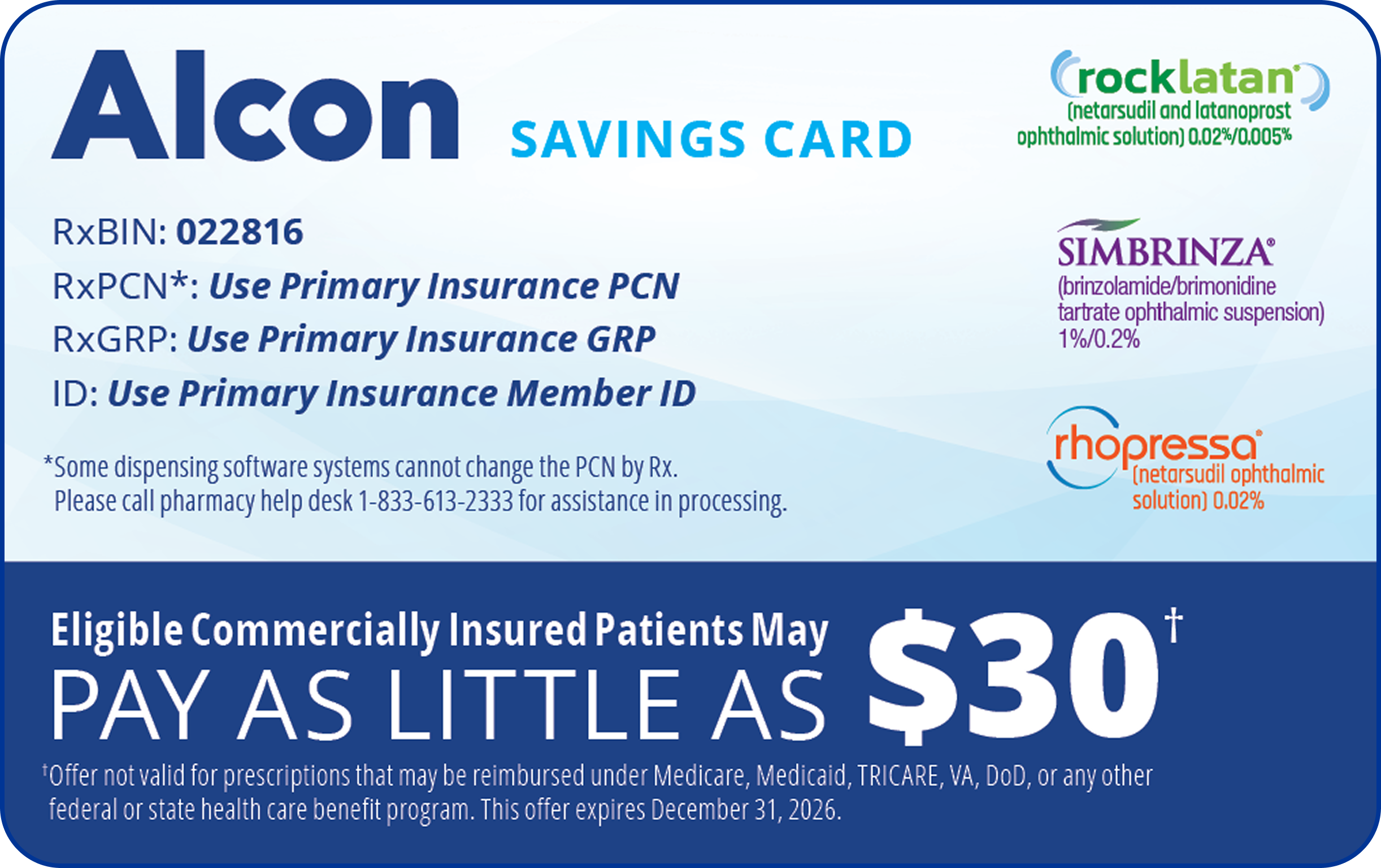Guide your patients to available support
Alcon is committed to assisting each patient's unique needs and helping them get the most out of treatment with ROCKLATAN®
Available support
Patients can save on prescriptions with the Alcon Savings Card
Eligible commercially insured patients may pay as little as $30 with the Savings Card.*

Encourage your patients to partake in Alcon's support offerings
*Restrictions apply. Patients with federal or state prescription coverage, such as Medicare or Medicaid, are not eligible for the Savings Card. For full Terms and Conditions, please see myalcon.com/rxaccess.
Alcon is committed to supporting patient access to medications
IMPORTANT SAFETY INFORMATION
Warnings and Precautions
- Epithelial corneal edema, described as honeycomb or bullous, has been reported in some patients with pre-existing corneal stromal edema or following ocular procedures that could affect corneal endothelial function. Epithelial corneal edema typically resolves upon discontinuation of ROCKLATAN®. Advise patients to notify their physician if they experience eye pain or decreased vision while using ROCKLATAN®.
INDICATIONS AND USAGE
ROCKLATAN® (netarsudil and latanoprost ophthalmic solution) 0.02%/0.005%, is a fixed dose combination of a Rho kinase inhibitor and a prostaglandin F2α analogue indicated for the reduction of elevated intraocular pressure (IOP) in patients with open-angle glaucoma or ocular hypertension.
- Increased pigmentation of the iris, periorbital tissue (eyelid), and eyelashes can occur. Iris pigmentation likely to be permanent.
- Gradual change to eyelashes may include increased length, thickness, number, and misdirected growth of lashes. Usually reversible upon discontinuation of treatment.
- Use with caution in patients with a history of intraocular inflammation (iritis/uveitis). Should generally not be used in patients with active intraocular inflammation.
- Macular edema, including cystoid macular edema, has been reported with latanoprost. Use with caution in aphakic patients, pseudophakic patients with a torn posterior lens capsule, or patients with known risk factors for macular edema.
- Use with caution in patients with a history of herpetic keratitis. Avoid use in cases of active herpes simplex keratitis.
- There have been reports of bacterial keratitis associated with the use of multiple-dose containers of topical ophthalmic products. These containers had been inadvertently contaminated by patients who, in most cases, had a concurrent corneal disease or a disruption of the ocular epithelial surface.
- Contact lenses should be removed prior to the administration of ROCKLATAN® and may be reinserted 15 minutes after administration.
INDICATIONS AND USAGE
ROCKLATAN® (netarsudil and latanoprost ophthalmic solution) 0.02%/0.005% is indicated for the reduction of elevated intraocular pressure (IOP) in patients with open-angle glaucoma or ocular hypertension.
Adverse Reactions
The most common ocular adverse reaction observed in controlled clinical studies with ROCKLATAN® was conjunctival hyperemia which was reported in 59% of patients. Five percent of patients discontinued therapy due to conjunctival hyperemia. Other common ocular adverse reactions reported were: instillation site pain (20%), corneal verticillata (15%), and conjunctival hemorrhage (11%). Eye pruritus, visual acuity reduced, increased lacrimation, instillation site discomfort, and blurred vision were reported in 5-8% of patients.
Please click here for the ROCKLATAN® Full Prescribing Information.
